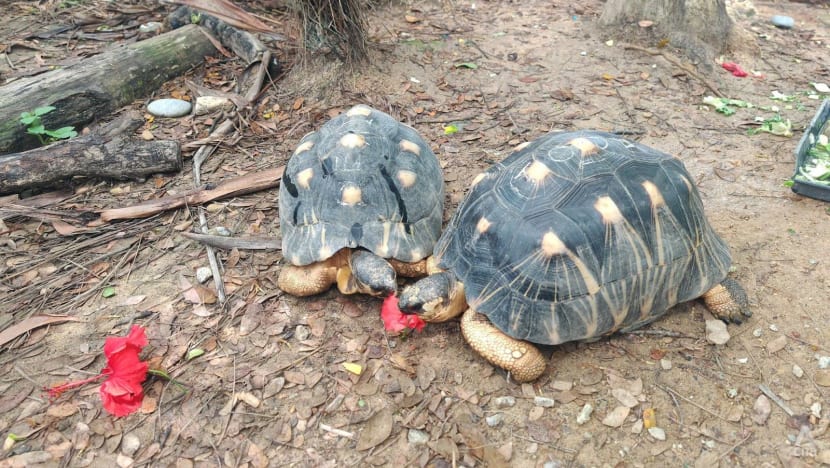50% jump in call volume in 4 years: ACRES hotline no longer 24 hours over heavy caseload
From Jun 15, the animal welfare group's hotline will not be manned between 1am and 7am as it receives fewer than 19 calls a month during this time frame.


This audio is generated by an AI tool.
SINGAPORE: The Animal Concerns Research & Education Society (ACRES) has seen a 50 per cent increase in call volume and a rise in the number of animals treated in the past four years.
In response to CNA's queries on why it has decided to cut the manned operation hours of its hotline, ACRES said on Wednesday (Jun 12) it needs to engage more staff in the face of an increasing workload.
The animal welfare group said in a Facebook post on Sunday that it will no longer be running a 24-hour wildlife rescue hotline.
Instead, the hotline will be manned from 7am to 1am daily, starting from Jun 15. During unmanned hours, it will provide automated guidance via WhatsApp and alternative means for animals who require urgent rescue, it added.
In FY2023, ACRES received 15,000 calls - around 1,250 a month - via its hotline, a big jump from the 9,800 calls in FY2019.
The organisation conducts an average of 375 wildlife rescues a month solely from calls to its hotline.
"We tried various means to manage the additional work with varied success, such as by encouraging volunteerism and purchasing a quick response vehicle for use in suitable situations to supplement our rescue van," co-CEO Anbarasi Boopal said.
After some deliberation, it decided to reduce the hotline's manned hours to 18 hours.
ACRES has chosen not to service the hotline between 1am and 7am to "minimise inconvenience to callers", as it receives fewer than 19 calls a month during this six-hour window, said Ms Anbarasi.
Written guidance and alternative rescue options will be provided via the hotline during the unmanned hours.
In addition to the automated guidance via WhatsApp, those who need assistance may also find online wildlife advisories on the ACRES website, she added.
In its Facebook post, ACRES cited a lack of funding and an increase in the number of animals it rescues and rehabilitates as reasons for no longer running a 24-hour wildlife rescue hotline.
As a charity, ACRES receives funds through donations, grants, and fees from services and programmes. Its most recent charity gala dinner in May raised S$310,273 (US$229,373), according to its Facebook post on the event.
Asked about the gala, Ms Anbarasi said the focused fundraising then was for the purpose of expanding ACRES' sanctuary and boost efforts to repatriate the non-native species it rescues.
ACRES previously told CNA about its goal to expand its sanctuary in Sungei Tengah from its current 0.5ha to 2ha - a space critical to its operations and rehabilitation efforts. In May, the wildlife rescue centre housed 125 exotic species and was at 95 per cent capacity for its animal occupants.
"As we expand as an animal welfare organisation, we will continually assess our human resource needs and fundraise to engage additional staff to meet anticipated needs," Ms Anbarasi said.
"We will be doing this in tandem with expansion of the sanctuary and our campaign work," she said, adding that the public can follow donation drives and donate through ACRES' website, or sign up as volunteers.
RISING ANIMAL RESCUE CASELOAD
Numbers from ACRES' 2023 annual report presented a mixed picture of the company's funding. The organisation received more donations in 2023 compared to 2022, but saw only one-third of revenue from its 2023 donations compared to the year before.
It also received less income from fees in 2023, but more from fundraising, compared to the year before.
An increase in animal rescue caseload is not unique to ACRES. One of its partners, wildlife management company JK Wildlife, is also feeling the pressure.
The privately-run firm, which began operations in 2021, handled 1,434 cases in 2023, and 987 cases from January to May alone. These cases range from wildlife rescue to animal exclusion services handled by the company's six full-time staff members and a small group of volunteers.
"We are definitely busier than we were before, and we appreciate the chance to help rescue more animals in need," founder Joe Kam told CNA.
Mr Kam said the increase in cases could be due to the loss of natural habitats, causing animals to venture into populated areas in search of new territories.
Other possible causes include an increase in direct and indirect feeding, poor waste management, and fragmented green spaces leading to more human-wildlife interaction when animals move through human-populated areas, said Mr Kam.
In recent years, encounters with boars, otters, monkeys and snakes in residential areas have also made the news.
"The number of cases has risen. It is not just rescue cases that are increasing, but also cases of human-wildlife conflicts where humans unintentionally create a hospitable environment for the animals," he said.



















